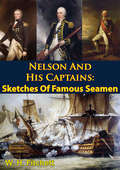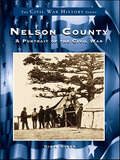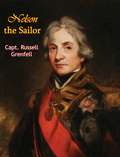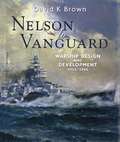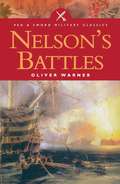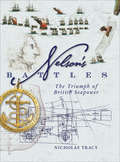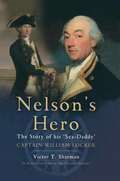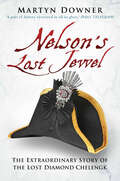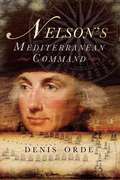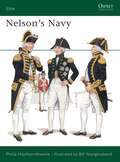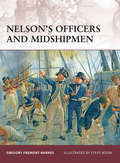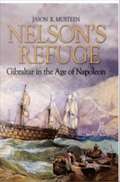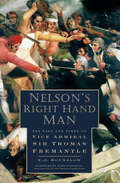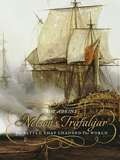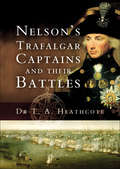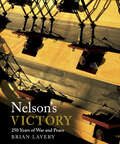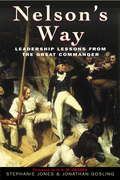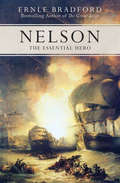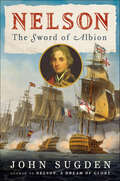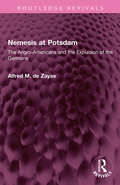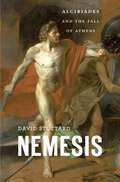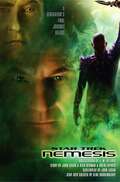- Table View
- List View
Nelson And His Captains: Sketches Of Famous Seamen [Illustrated Edition]
by William Henry FitchettIncludes 11 portraitsNELSON is the only figure amongst the great sea-captains of the Napoleonic war of which the human memory keeps any vivid image. The iron face of Jervis looks out on us for a moment from the smoke of St. Vincent, gloomy, stern, and cynical, and then vanishes! Collingwood, who led down on the Franco-Spanish line at Trafalgar in a fashion so stately, and in advance even of Nelson, and who lies in the great crypt of St. Paul's beside his famous chief, is, for the general reader, little more than a name. Cornwallis, the hero of the tireless and memorable blockade of Brest, is scarcely even a name. Who remembers aught of Barham, the white-haired veteran--sea-dog, as well as sea-lord--who devised, almost off-hand, the counter-stroke that shattered Napoleon's sea strategy and made Trafalgar possible?Nelson is the one sea-captain of the Great War who has stamped his image imperishably on the imagination of the English-speaking race.Whether, indeed, Nelson was in a technical sense "the greatest sailor since the world began," need not be discussed. In the art of taking care of ship and canvas in rough weather some of his own captains probably surpassed him. In the genius that wielded fleets he was supreme! And in the great drama of Napoleonic wars there are --for the man in the street--only three supreme names, that of Napoleon himself, of Wellington, and of Nelson, and Nelson was as great on sea as his two rivals in fame were great on land.This work is an account, not so much of Nelson as of his captains--the men of the Nile and of Trafalgar. "They," said Nelson, of a group of his captains, "are my children; they serve in my school, and I glory in them." And we cannot understand the "school" without some clear mental image of the master who stamped his impress so deeply on it.
Nelson County: A Portrait of the Civil War (Civil War Series)
by Dixie HibbsThe occupation of Bardstown and Nelson County, Kentucky, by Union troops began in September of 1861 and ended in September of 1865�a turbulent time in the �neutral� county, and a piece of history rarely explored by Kentuckians. In this unprecedented visualjourney, discover the unique role that Nelson County and Kentucky played in the Civil War as a military crossroads and the site of many Union training camps.More than 80 different Union units were involved in skirmishes and set up camps in Nelson County during the war. The county�s turnpikes and railroads dictated the movement of many troops and supplies through the area�both Union and Confederate. Includedin these pages are historical images, maps, documents, and vivid accounts passed down from generation to generation that bring the war to life. From the Confederate invasion of 1862 and the Guerrilla activities of 1864�1865 to the last surrender at Samuel�s Depot on July 26 and the aftermath of the war, A Portrait of the Civil War inNelson County offers a unique perspective of the war�s effects on one county and its people.
Nelson the Sailor [Illustrated Edition]
by Capt. Russell GrenfellLord Nelson sailed across the ocean, but tides can turn and winds can blow. This exploration of his short life takes a balanced view of his achievements and failures as not necessarily making for smooth sailing.With plates and diagrams."A critical study from the naval officer's angle."--The Naval Review"Captain Grenfell has both the background and literary ability to bring the whole dramatic story brilliantly alive."--San Francisco Chronicle"A remarkably lucid account."--Time Magazine"Thoroughly rewarding."--New York Times"Full of dramatic interest."--Times Literary Supplement
Nelson to Vanguard: Warship Design and Development, 1923–1945
by David K. BrownNelson to Vanguard is the third volume in D K Browns bestselling series on warship design and development looks at the Royal Navys response to the restrictions placed on it by the Washington Naval Treaties in the inter-war years, and analyses the fleet that was constructed to fight the Second World War. He focusses on the principal pre-war developments such as the first purpose-built aircraft carriers and the growing perception of the threat of air attack to warships. All the wartime construction programmes are covered, such as the massive expansion in escort ships to counter the U-boat menace, and the development of the amphibious warfare fleet for the D-Day landings in 1944. Full analysis is also provided of the experience of wartime damage, as well as the once top secret pre- and post-war damage trials.Illustrated throughout with a superb collection of contemporary photographs and numerous line drawings, this now classic work is required reading for naval historians and enthusiasts.
Nelson's Battles (Pen & Sword Military Classics)
by Oliver WarnerHoratio Nelson was a hero from the time when his dramatic initiative won the battle of St Vincent in 1797, while his last battle, at Trafalgar, reduced the enemy naval forces so thoroughly that they were no longer able to have any bearing on the outcome of the war. As well as being a brilliant study of those naval battles which played such an important role in Napoleon's defeat, it also makes a close study of the admiral's art which, during the last years of the eighteenth century, developed faster than at any time since the previous century and led to Britain's mastery of the seas for more than 100 years. The Seven Years War and the War of the American Revolution stimulated the development of new ideas and the experience gained from them, as well as the developments in ship design and signalling, and the perfection of drill, transformed naval methods. Nelson became a master of them all. This technical prowess, combined with a remarkable ability to lead his men and his genius for making decisive moves, 'the Nelson touch', made him the consummate master of naval warfare. Highly readable, concise and insightful, this new edition will prove a popular choice for those seeking an introduction to naval warfare in the age of sail
Nelson's Battles: The Triumph of British Seapower
by Nicholas TracyHoratio Nelson was a hero from the time when his dramatic initiative won the battle of St Vincent in 1797, while his last battle, at Trafalgar, reduced the enemy naval forces so thoroughly that they were no longer able to have any bearing on the outcome of the war. As well as being a brilliant study of those naval battles which played such an important role in Napoleon's defeat, it also makes a close study of the admiral's art which, during the last years of the eighteenth century, developed faster than at any time since the previous century and led to Britain's mastery of the seas for more than 100 years. The Seven Years War and the War of the American Revolution stimulated the development of new ideas and the experience gained from them, as well as the developments in ship design and signalling, and the perfection of drill, transformed naval methods. Nelson became a master of them all. This technical prowess, combined with a remarkable ability to lead his men and his genius for making decisive moves, 'the Nelson touch', made him the consummate master of naval warfare. Highly readable, concise and insightful, this new edition will prove a popular choice for those seeking an introduction to naval warfare in the age of sail
Nelson's Hero: The Story of His 'Sea-Daddy' Captain William Locker
by Victor T. SharmanHoratio Nelson's first captain was William Locker who recognised the exceptional talents of the young midshipman who was to become the most famous sailor in history. Thirty-seven years later Admiral Lord Nelson wrote to Locker 'I have been your scholar; it was you who taught me to board a Frenchman by your conduct It is you who always taught me to lay a Frenchman close and you will beat him. My only merit in my profession is being a good scholar'. Captain William Locker's career as a Sea Captain fighting the King's enemies on the high seas makes gripping reading and high drama.
Nelson's Lost Jewel: The Extraordinary Story of the Lost Diamond Chelengk
by Martyn DownerAdmiral Lord Nelson’s diamond Chelengk is one of the most famous and iconic jewels in British history. Presented to Nelson by the Sultan Selim III of Turkey after the Battle of the Nile in 1798, the jewel had thirteen diamond rays to represent the French ships captured or destroyed at the action. A central diamond star on the jewel was powered by clockwork to rotate in wear. Nelson wore the Chelengk on his hat like a turban jewel, sparking a fashion craze for similar jewels in England. The jewel became his trademark to be endlessly copied in portraits and busts to this day.After Trafalgar, the Chelengk was inherited by Nelson’s family and worn at the Court of Queen Victoria. Sold at auction in 1895 it eventually found its way to the newly opened National Maritime Museum in Greenwich where it was a star exhibit. In 1951 the jewel was stolen in a daring raid by an infamous cat-burglar and lost forever.For the first time, Martyn Downer tells the extraordinary true story of the Chelengk: from its gift to Nelson by the Sultan of Turkey to its tragic post-war theft, charting the jewel’s journey through history and forging sparkling new and intimate portraits of Nelson, of his friends and rivals, and of the woman he loved.
Nelson's Mediterranean Command
by Denis OrdeIn 1798 Napoleon Bonaparte, who was all but Master of Europe, assembled a formidable expeditionary force at Toulon. While its purpose was unknown there was every reason to believe that Great Britain was its destination and the Nation was on invasion alert.The overwhelming British priority was for a fleet to be assembled and sent to the Mediterranean to destroy this threat before the French force could set sail.The burning issue was which of four Royal Naval flag officers should command this vital mission? The strong field in order of seniority was Admiral The Earl St Vincent, Rear Admirals Sir William Parker, Sir John Orde and Sir Horatio Nelson. The choice of Nelson who went on the win the Battle of Nice provoked great anger and even a challenge by Orde for a duel, only prevented buy the King's intervention.Nelson's and Orde's acrimonious relationship erupted in the months before the Battle of Trafalgar and is well documented in this fascinating book.
Nelson's Navy
by Bill Younghusband Philip HaythornthwaiteDespite the many celebrated victories of the British Army during the Napoleonic Wars (1799-1815), the role of the Royal Navy should never be overlooked. The 'wooden walls' formed the country's first and most important line of defence, and ranged throughout the world to protect Britain's trade-routes and in support of the land forces and overseas possessions. This book covers the huge variations in uniforms not just in the Navy but the Royal Marines and Infantry regiments which served alongside naval crews. It also looks at the organisation, training and recruitment of the force and corrects a number of misconceptions regarding impressment and training.
Nelson's Officers and Midshipmen
by Steve Noon Gregory Fremont-BarnesImmortalized in literature through such characters as C. S. Forester's 'Horatio Hornblower' and Patrick O'Brian's 'Jack Aubrey', the officers and midshipmen of the Royal Navy during the Revolutionary (1792-1802) and Napoleonic Wars (1799-1815) ran the ships that defended Great Britain against the threat of French invasion. This period saw the Royal Navy achieve its most momentous victories at the Nile, Copenhagen and Trafalgar, victories that laid the basis for a period of British naval and imperial supremacy that would last a century.The men who commanded these ships went through a long apprenticeship, often going to sea at the age of 12 or younger. They could serve for up to 60 years, progressing through the ranks in a service that rewarded success in battle and merit to a much larger extent than the contemporary British Army.This title, the companion volume to Warrior 100: Nelson's Sailors, describes the harsh realities of life in the Georgian Royal Navy for all ranks of officer from the lowest midshipman to the most senior admiral and covers the exploits of men such as Horatio Nelson and Thomas Cochrane who provided the basis for the fictional figures that remain so popular to this day.
Nelson's Refuge
by Jason R. MusteenSince its capture from Spain in 1704, Gibraltar has been one of Great Britain's most legendary citadels. As the gatekeeper of the Mediterranean Sea, its commanding position has shaped the history of the region and surrounding nations, including modern Britain. The fortress, its garrison, and its leaders were witness to and participant in both the rise and the fall of the first emperor of France, whose attempt at European conquest gave birth to the ascendancy of Gibraltar's true importance and its position in world affairs. However, despite its 2,500 year old history, no study has existed that examines the role of the fortress during the Napoleonic Wars (1793-1815). It was during that important period that the well-known defensive might of Gibraltar was converted to offensive potential for the British army and was united with the previously under appreciated strategic value of the Rock for the Royal Navy. That combination of military and naval might transformed Gibraltar into a base capable of meeting the various demands in the Mediterranean for many years to come. Nelson's Refuge examines Gibraltar's growth during the two decade struggle with Napoleonic France. As a forward base for the operations of the Royal Navy and Army, the peninsula allowed Horatio Nelson to achieve his victories at the Nile and at Trafalgar. The book also describes how Gibraltar served as the base of secret negotiations that brought Spain to the British side during the Peninsular War and further served as the most forward operations base for the British in that war.
Nelson's Right Hand Man: The Life and Times of Vice Admiral Sir Thomas Fremantle
by E. J. Hounslow John FremantleThis is the story of Thomas Fremantle, one of Britain's greatest naval captains and Lord Nelson's closest friend and ally. The two, bound in friendship, were part of a Navy that ensured Napoleon could never invade Britain. The naval campaign culminated in the great victory at Trafalgar and, with the fleet in mourning for the loss of Admiral Nelson, it was Thomas Fremantle who towed the shattered Victory and Nelson's body back to Gibraltar. Promoted to Vice Admiral, Fremantle liberated the whole of the Adriatic from the clutches of the French revolutionary government and in doing so captured many ships, thus earning him and his family a fortune in prize money. Yet, there is more to Thomas Fremantle's story than his accomplishments at sea. He was also a lover, a husband and a doting father to his large family. Together with Betsey Wynne, the woman he wooed and subsequently married in Italy, he created a domestic idyll in the small Buckinghamshire village of Swanbourne. It is through Betsey's comprehensive diaries that we are able to gain a fascinating insight into her husband, the man behind the uniform.
Nelson's Trafalgar
by Roy AdkinsAn explosive chronicle of history's greatest sea battle In the tradition of Antony Beevor's Stalingrad, Nelson's Trafalgar presents the definitive blow-by-blow account of the world's most famous naval battle, when the British Royal Navy under Lord Horatio Nelson dealt a decisive blow to the forces of Napoleon. The Battle of Trafalgar comes boldly to life in this definitive work that re-creates those five momentous, earsplitting hours with unrivaled detail and intensity. .
Nelson's Trafalgar Captains and Their Battles
by T. A. HeathcoteThis is a biographical dictionary of the two flag officers and captains of 27 battleships, four frigates and two minor combatant vessels that were present under Nelson's command at the historic battle of Trafalgar, 21 October 1805. Each officer's family background and naval career will be covered and his and his ship's role in the Battle analyzed. In addition there will be a general introduction.
Nelson's Victory: 250 Years of War and Peace
by Brian LaveryMay 2015 sees the 250th anniversary of the launch of HMS Victory, the ship that is so closely associated with Nelson and his great victory at Trafalgar and which, still extant, has today become the embodiment of the great Age of Sail. Many books have been written about Victory but none like this, which tells the full story of the ship since she first took to the waters in May 1765. It contains many surprises that she was almost wrecked on her launch; that diplomacy conducted onboard her played a crucial role in provoking Napoleon's invasion of Russia in 1812; and that in 1914 Kaiser Wilhelm set the First World War in motion at a desk made from her timbers. The book also tells the story of Horatio Nelson, who was born a few weeks before his most famous ship was ordered, and whose career paralleled hers in many ways. It does not ignore the battle of Trafalgar, and indeed it offers new insights into the campaign which led up to it. But it says much more about the other lives of the ship, which at different times was a flagship, a fighting ship, a prison hospital ship, a training ship for officers and boys, a floating courtroom, a signal school in the early days of radio, tourist attraction and national icon. It looks at her through many eyes, including Queen Victoria, admirals, midshipmen and ordinary seamen, and Beatrix Potter who visited as a girl. It is simply a 'must-have' work for historians and enthusiasts, and a compelling new narrative for the general reader.
Nelson's Way
by Stephanie Jones Jonathan GoslingLord Nelson's widely admired approach to leadership and management is distilled into a series of practical insights for today's managers.
Nelson's Way: Leadership Lessons from the Great Commander
by Stephanie Jones Jonathan GoslingThis is a one-of-a-kind look at Nelson and his leadership skills Vice Admiral Horatio Lord Nelson has been widely admired as a celebrated and effective leader. His dynamic approach to leadership and management has now been translated into a timeless, practical and contemporary insight for today's managers. Nelson's Way will bring 'The Nelson Touch' of luck, inspiration and leadership to everyone. Explaining how Nelson embodies the characteristics of the most successful of leaders, from bravery to determination, inspiration to luck and simplicity to unconventionality. Jones and Gosling explore and examine the self-made legend set against the backdrop of the high-seas, personal sacrifice, debilitating injuries and glorious conquests. With chapters including: Making Heroes, The Band of Brothers and Creating (and Sustaining) a Legend, Nelson's Way incorporates the latest research and joins a series of ground-breaking studies applying historical biography to business to create the most comprehensive insight into Nelson, his heroic exploits and legendary leadership skills.
Nelson: The Essential Hero
by Ernle BradfordA gripping biography of Admiral Nelson, Napoleonic War hero and one of Britain&’s greatest naval tacticians. In the Battle of Trafalgar, Admiral Horatio Lord Nelson sent the signal from his flagship HMS Victory, &“England expects that every man will do his duty.&” His defeat of the French that day in 1805 was a decisive turning point in the Napoleonic Wars, establishing British control of the seas. His death in that heroic battle gave those words immortal significance. For his bravery in battle and brilliance as a naval tactician, Admiral Nelson remains one of Britain&’s most inspiring heroes. In this nuanced and lively biography, Ernle Bradford presents the man behind the legend. From his youthful days in the Royal Navy to his famous battles and scandalous personal life, Horatio Nelson is shown here in all his human complexity. &“This skillful portrait . . . combines accessible naval history with a psychological examination of heroism.&” —Kirkus Reviews
Nelson: The Sword of Albion
by John SugdenThe most authoritative and intimate portrait written of Horatio NelsonIn this epic biography of British history's most celebrated naval commander, acclaimed historian John Sugden separates fact from myth to offer a powerful portrait of the military hero of Trafalgar.As was true of the Sugden's riveting account of Horatio Nelson's early years (Nelson: A Dream of Glory, 2005), this comprehensive life of Lord Nelson is built from largely overlooked primary documents, letters, and diaries that reach across two centuries to invite us to share Nelson's multifaceted life in the Napoleonic Wars.The Sword of Albion offers the sweep and intimacy of first-rate historical fiction—revealing the interior lives, for example, of Lord Nelson's wife, Fanny and family and the caring and more passionate Emma, Lady Hamilton, who nursed the war-weary hero back to health in Naples and London after his brilliant victory over the Spanish fleet at Cape St. Vincent in 1797 and the stunning defeat at Tenerife that cost Nelson his right arm.Today's reader comes to understand that every obstacle in Nelson's path was attacked head-on with an Achilles-like ferocity and resolve. Yet his life was no steady upward trajectory; it was instead plagued by injuries and debt for the commoner admiral in a royal navy and English society dominated by lineage and property. As Sugden points out, "His life was a mission with the essence of a tour de force, hurrying toward a bloody climax that would change the fate of empires."
Nemesis
by Rory ClementsA race against time to unmask a Nazi spy. In a great English house, a young woman offers herself to one of the most powerful and influential figures in the land - but this is no ordinary seduction. She plans to ensure his death . . . On holiday in France, Professor Tom Wilde discovers his brilliant student Marcus Marfield, who disappeared two years earlier to join the International Brigades in Spain, in the Le Vernet concentration camp in the foothills of the Pyrenees. Wilde secures his release just as German tanks roll into Poland. Meanwhile, a U-boat sinks the liner Athenia in the Atlantic with many casualties, including Americans, onboard. Goebbels claims Churchill put a bomb in the ship to blame Germany and to lure America into the war. As the various strands of an international conspiracy begin to unwind, Tom Wilde will find himself in great personal danger. For just who is Marcus Marfield? And where does his loyalty lie?
Nemesis at Potsdam: The Anglo-Americans and the Expulsion of the Germans (Routledge Revivals)
by Alfred M. ZayasFirst published in 1979, Nemesis at Potsdam discusses the expulsion and spoliation of the Germans from most of central and easter Europe during the Second World War, a process which over two million did not survive. How did this extraordinary event come about? Was it necessary for the peace of Europe? What role did Britain and the United States play in authorizing the ‘transfer’? The book answers these questions and relates the integration of the German expellees to the phenomenal resurgence of West Germany, and traces the development of Ostpolitik and détente through to the Helsinki Declaration. It will be of interest to students of history, international relations, and political science.
Nemesis: Alcibiades and the Fall of Athens
by David StuttardAlcibiades was one of the most dazzling figures of the Golden Age of Athens. A ward of Pericles and a friend of Socrates, he was spectacularly rich, bewitchingly handsome and charismatic, a skilled general, and a ruthless politician. He was also a serial traitor, infamous for his dizzying changes of loyalty in the Peloponnesian War. Nemesis tells the story of this extraordinary life and the turbulent world that Alcibiades set out to conquer. David Stuttard recreates ancient Athens at the height of its glory as he follows Alcibiades from childhood to political power. Outraged by Alcibiades’ celebrity lifestyle, his enemies sought every chance to undermine him. Eventually, facing a capital charge of impiety, Alcibiades escaped to the enemy, Sparta. There he traded military intelligence for safety until, suspected of seducing a Spartan queen, he was forced to flee again—this time to Greece’s long-term foes, the Persians. Miraculously, though, he engineered a recall to Athens as Supreme Commander, but—suffering a reversal—he took flight to Thrace, where he lived as a warlord. At last in Anatolia, tracked by his enemies, he died naked and alone in a hail of arrows. As he follows Alcibiades’ journeys crisscrossing the Mediterranean from mainland Greece to Syracuse, Sardis, and Byzantium, Stuttard weaves together the threads of Alcibiades’ adventures against a backdrop of cultural splendor and international chaos. Navigating often contradictory evidence, Nemesis provides a coherent and spellbinding account of a life that has gripped historians, storytellers, and artists for more than two thousand years.
Nemesis: Star Trek The Next Generation (Star Trek)
by J.M. DillardRemus—mysterious sister world to Romulus. A planet where hope surrendered to darkness long ago. A planet whose inhabitants have been without a voice for generations. But that's about to change.Earth—home to Starfleet, where the crew of the U.S.S. Enterprise NCC-1701-E, gathers under the crystal blue skies of an Alaskan day to celebrate the wedding of Will Riker and Deanna Troi. The joy of the day is overshadowed only by the knowledge that this is the last time they will all be together, as soon-to-be Captain Riker and his ship's counselor, Deanna Troi, will soon be departing for their new ship. Captain Jean-Luc Picard and the Enterprise crew are suddenly diverted for an unexpected diplomatic mission to the planet Romulus. Longtime enemies of the Federation, the Romulans have expressed their desire to initiate negotiations that will hopefully lead to a long-awaited unity in the galaxy. But upon their arrival on Romulus, the Enterprise crew is faced with a threat that could lead to the destruction of the planet Earth, and Picard comes face to face with a man who may prove to be his most dangerous adversary yet...and a surprisingly personal nemesis.
Nemesis: The Last Days of the American Republic
by Chalmers JohnsonNemesis is the last volume in Johnson's trilogy, which began with Blowback, and continued with The Sorrows of Empire. In those two, Johnson argued American clandestine and military activity has led to unintended but direct disaster here in the United States. In his new book, Johnson argues that US military and economic overreach may actually lead to the nation's collapse as a constitutional republic.
